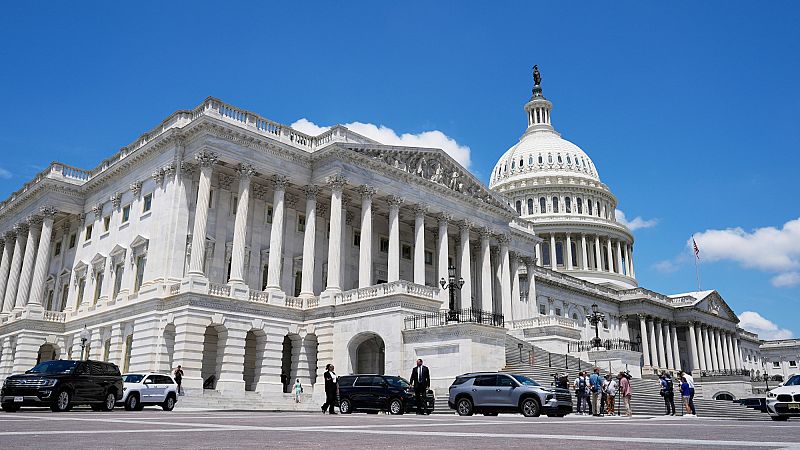
The Republican-controlled US House of Representatives advanced President Donald Trump's tax and spending bill on Thursday, laying the groundwork for a possible passage of the legislation in a vote expected later in the day.
The House voted 219 to 213 to move forward.
This came after the House Republicans were straining past midnight to advance President Donald Trump's tax and spending cuts package. GOP leaders had spent the afternoon and evening working furiously to persuade sceptical holdouts to send it to his desk by the Fourth of July deadline.
“Our way is to plow through and get it done,” House Speaker Mike Johnson said, emerging in the middle of the night from a series of closed-door meetings. “We will meet our July 4th deadline.”
The roll call vote that started late on Wednesday was held open for hours as several Republicans refused to give their votes. With few to spare from their slim majority, the outcome was in jeopardy. House Speaker Mike Johnson had recalled lawmakers to Washington, eager to seize on the momentum of the bill's passage the day before in the Senate, and he vowed to press ahead.
But as voting stalled Trump lashed out in a midnight post: “What are the Republicans waiting for??? What are you trying to prove???” He also warned of political fallout from the delay: “Costing you votes!!!”
The idea of quickly convening for a vote on the more than 800-page bill was a risky gambit, one designed to meet Trump's demand for a holiday finish. Republicans have struggled mightily with the bill nearly every step of the way, often succeeding by the narrowest of margins — just one vote. Their slim 220-212 majority left little room for defections.
Several Republicans were balking at being asked to rubber-stamp the Senate version less than 24 hours after passage. A number of moderate Republicans from competitive districts objected to the Senate bill's cuts to Medicaid, while conservatives lambasted the legislation as straying from their fiscal goals.
It fell to Johnson and his team to convince them that the time for negotiations was over. Lawmakers also headed to the White House for a two-hour session on Wednesday to talk to the president about their concerns.
Republicans relied on their majority hold of Congress to push the package over a wall of unified Democratic opposition.
“Hell no!” said House Democratic Leader Hakeem Jeffries, flanked by fellow Democrats outside the Capitol, before the bill advanced in the House.
In an early warning sign of Republican resistance, a resolution setting up terms for debating Trump's bill barely cleared the House Rules Committee on Wednesday morning. As soon as it came to the full House, it stalled out as GOP leadership waited for lawmakers who were delayed coming back to Washington and conducted closed-door negotiations with holdouts.
Trump urged Republicans to do ‘the right thing’
The bill would extend and make permanent various individual and business tax breaks from Trump's first term, plus temporarily add new ones he promised during the 2024 campaign. This includes allowing workers to deduct tips and overtime pay, and a $6,000 (€5,000) deduction for most older adults earning less than $75,000 (€64,000) a year. In all, the legislation contains about $4.5 trillion (€3.8tn) in tax cuts over 10 years.
The bill also provides about $350 billion (€297bn) for defence and Trump's immigration crackdown. Republicans partially pay for it all by less spending on Medicaid and food assistance. The Congressional Budget Office projects the bill will add about $3.3 trillion (€1.8tn) to the federal debt over the coming decade.
The House passed its version of the bill in May by a single vote, despite worries about spending cuts and the overall price tag. Now it's being asked to give final passage to a version that, in many respects, exacerbates those concerns. The Senate bill's projected impact on the nation's debt, for example, is significantly higher.
“Let's go Republicans and everyone else,” Trump said in a late evening post.
Speaker Johnson is intent on meeting Trump's timeline and bet that hesitant Republicans wouldn't cross the president because of the heavy political price they would have to pay.
They need only look to Senator Thom Tillis from North Carolina, who announced his intention to vote against the legislation over the weekend. Soon, the president was calling for a primary challenger to the senator and criticising him on social media. Tillis quickly announced he would not seek a third term.
Democrats targeted vulnerable Republicans to join them in opposition
Flanked by nearly every member of his caucus, Democratic Leader Jeffries of New York delivered a pointed message: With all Democrats voting “no”, they only needed to flip four Republicans to prevent the bill from passing.
Jeffries invoked the “courage” of the late Senator John McCain giving a thumbs-down to the GOP effort to “repeal and replace” the Affordable Care Act, and singled out Republicans from districts expected to be highly competitive in 2026, including two from Pennsylvania.
“Why would Rob Bresnahan vote for this bill? Why would Scott Perry vote for this bill?” Jeffries asked.
Democrats have described the bill in dire terms, warning that Medicaid cuts would result in lives lost and food stamp cuts would be “literally ripping the food out of the mouths of children, veterans and seniors,” Jeffries said Monday.
Republicans say they are trying to right-size the safety net programs for the population they were initially designed to serve, mainly pregnant women, the disabled and children, and root out what they describe as waste, fraud and abuse.
The package includes new 80-hour-a-month work requirements for many adults receiving Medicaid and applies existing work requirements in the Supplemental Nutrition Assistance Program, or SNAP, to more beneficiaries. States will also pick up more of the cost for food benefits.
The driving force behind the bill, however, is the tax cuts. Many expire at the end of this year if Congress doesn't act.
The Tax Policy Center, which provides nonpartisan analysis of tax and budget policy, projected the bill would result next year in a $150 (€127) tax break for the lowest quintile of Americans, a $1,750 (€1,480) tax cut for the middle quintile and a $10,950 (€9,290) tax cut for the top quintile. That's compared with what they would face if the 2017 tax cuts expired.







